Faculty of International Studies Department of Intercultural Studies Supporting a Diverse and Inclusive Society
English translation in progress. Thank you for waiting.
Contents
Department Overview
This Department is suitable for the following people:
- Those who are interested in diversity
- Those who are inspired to study in an international city of religious significance
- Those who aim to become civics teachers or Japanese language teachers
Learning key points
01. Supporting a Diverse and Inclusive Society
The number of foreign nationals working and living in Japan continues to grow. Our Department is dedicated to cultivating individuals who can actively contribute to a diverse and inclusive society.
We offer diverse fieldwork opportunities, including participation in international events, that allow students to engage directly with people from different cultural backgrounds. Our program is ideal for those interested in key themes such as diversity and inclusion.
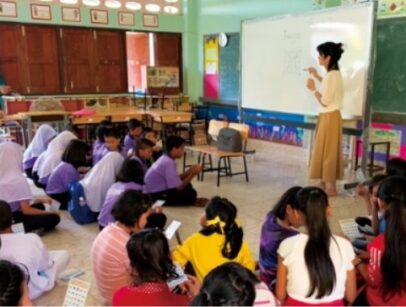
02. Learning "Elementary Japanese"
“Elementary Japanese” is a simplified form of the language that uses basic grammar and vocabulary to facilitate communication with non-native speakers living in local communities. Our department offers this as a required subject. Students learn how to convert standard Japanese into more accessible expressions, acquiring a “common language” that can be applied in various real-world contexts such as disaster preparedness and tourism.
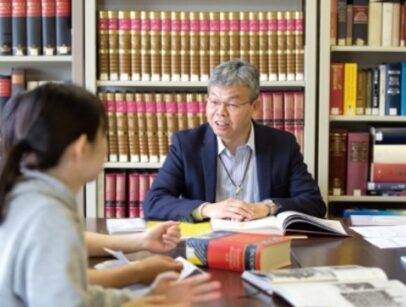
03. A Program to Make the Most of Your Learning for the Future
Tenri City is known as an international religious city, rich in cultural and social diversity. Gaining a deeper understanding of a society where people respect and embrace one another’s differences will enrich your character and empower you to succeed in a variety of career paths.
Our Department offers five enrollment models and qualification models tailored to different future goals, supporting students in shaping their unique paths forward.
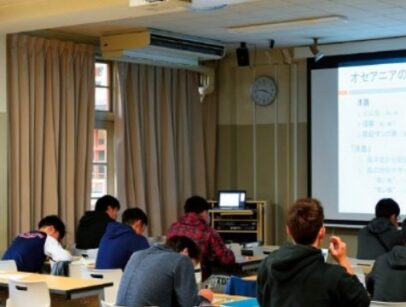
Enrollment models and qualification models to make the most of your learning for the future
Enrollment model for aspiring global contributors
This enrollment model is designed for students aiming to work in global fields after graduation, such as the tourism industry, international business, overseas mission, and international sports coaching.
- Future vision: Employment in the tourism industry, overseas mission, international sports coaching, etc.
Enrollment model for aspiring local contributors
In today’s world, where internal globalization is advancing and diverse people and cultures intersect, this enrollment model is designed for students who wish to contribute to society by connecting individuals and communities at the local level.
- Future vision: Government employee, healthcare, etc.
Enrollment model for the Glocal*-Minded
This enrollment model is designed for students who aim to address local issues from a global perspective, preparing for careers such as employees of multinational corporations, or Japanese language instructors.
* globally minded people working on local challenges / a concept that bridges globalism and localism
- Future vision: Overseas sales representative, multinational corporation, Japanese language instructor, etc.
“Teaching” Qualification Model (Civics / High School)
Students aim to obtain First Class Junior High School Teaching License (Social Studies) and First
Class High School Teaching License (Civics).
- Future vision: Junior high school and high school teachers (Social Studies / Civics), government employee, etc.
“Certified Social Researcher” Qualification Model
This qualification model is intended for students who wish to contribute to solving regional issues and promoting local revitalization by applying their knowledge of statistics and data analysis as certified social researchers.
- Future vision: Media, research and survey firms, etc.
Four-year learning process
First-year
続きを読むDeveloping Information-Gathering Skills and Language Proficiency
Students acquire foundational knowledge to understand the current state of multicultural coexistence in Japan and around the world, and to explore ideal approaches for such societies.
Representative Classes
 ・Elementary Japanese
・Elementary Japanese
This course explores how to convert everyday Japanese into “Elementary Japanese” that is easier for non- native speakers to understand, particularly in situations such as disaster response and tourism.
Second-year
続きを読むUnderstanding Diverse Cultures from an Interdisciplinary Perspective
Students will learn about the cultures of various regions, including Asia and Africa, using social science subjects such as economics and cultural anthropology as analytical tools.
Representative Classes
 ・Studies in Multiculturalism
・Studies in Multiculturalism
Students learn about the history and current situation of various minorities living in Japan and consider what perspectives are effective and necessary to move Japan closer to becoming a multicultural society.
Third-year
続きを読むAdvanced Courses + Practical Learning Begins
Students take more advanced courses such as “International Relations” and “Regional Integration.”
Practical learning also begins at this stage, including subjects like Volunteer Network.”Representative Classes
 ・Volunteer Network
・Volunteer Network
Students will explore the purposes and principles of volunteer activities and gain an understanding of their impact on individuals and society. They will also examine how these activities give rise to human networks, including their structures, characteristics, and broader social influence.
Fourth-year
続きを読むWork on a graduation thesis as the culmination of your studies
【Examples of graduation thesis themes】
- Sport and Ethnicity in Multicultural Australia
多民族国家オーストラリアにおけるスポーツとエスニシティ - The Social Position and Role of Kisaeng in Joseon Dynasty
李氏朝鮮における妓生の社会的位置づけと役割 - Issues Related to LGBT Rights in Japan: A Comparison with Europe and the Debate on Same-Sex Marriage
LGBTに関する日本の課題 —ヨーロッパとの比較と国内同性婚について— - The European Refugee Crisis and the Social Integration of Migrants: The Case of Germany as an Immigration Nation
欧州難民危機と移民の社会的統合 —移民国家ドイツの場合— - Conditions for Well-Being: Insights from the Lives of African Women
幸福の条件 —アフリカ女性の生活から—
- Sport and Ethnicity in Multicultural Australia
Available Qualifications
- First Class Junior High School Teaching License (Social Studies)
- First Class High School Teaching License (Civics)
- Qualification for appointment as a social welfare administrator
- Librarian
- Museum curator
- Japanese language teacher
- Corrections and Rehabilitation
- Missionary of the Tenrikyo church
Faculty list
Curriculum
Curriculum tree(PDF)
Curriculum map(PDF)
Education Policy
Admission Policy
In order to fulfill the educational goals of the Department of Intercultural Studies, we seek for students with the following qualities:
1. (Skill) Those with basic communication skills in Japanese and English, as acquired in high school or equivalent education.
2. (Knowledge) Those with a well-rounded academic foundation in subjects such as geography, history, civics, mathematics, and science.
3. (Thought) Those who are interested in people and cultures, and who are able to gather information and form their own opinions.
4. (Motivation) Those who are interested in diverse cultures and have a proactive attitude toward engaging with different cultural backgrounds.
5. (Attitude) Those who value diversity and are willing to engage with others in a sincere and respectful manner.
6. (Action) Those who have actively engaged in social or extracurricular activities, have developed intercultural communication skills and interdisciplinary knowledge, and aspire to apply these abilities in related fields.Entrance examination methods will take various forms, such as comprehensive selection, special
selection, school recommended selection, general selection, and transfer selection.Curriculum Policy
As common subjects offered by the Faculty of International Studies, we offer classes on the “Cultural Theory” and “History and Society” of regions around the world. Within the Department’s specialized subjects, students can further deepen their understanding of international cultures through four thematic areas—“Intercultural Understanding,” “Multiculturalism,” “International Affairs,” and “History and Culture”—along with social science-based subjects that further deepen students’ understanding of global cultures and societies.
In the first year, students take introductory seminars on these four themes, the required subject “Elementary Japanese” to better understand coexistence with foreign residents in Japan, and foundational subjects in the social sciences. In the second year, students engage in seminars, regional cultural studies, and introductory social science courses. In the third and fourth years, students move on to advanced seminars that lead to the graduation thesis and take subjects on the history and society of various world regions.
The curriculum also includes the necessary subjects to obtain a teaching license in “Civics” at the high school level, as well as those required to qualify as a certified social researcher.
In addition, the subject “Multicultural Experience Activities” offers opportunities to experience the realities of a multilingual and multicultural global society and to develop practical skills and awareness in intercultural understanding and international cooperation.Diploma Policy
A bachelor’s degree (Intercultural Studies) will be awarded to students who have acquired the following knowledge and abilities:
1. (Skill) Those who have acquired the information-gathering skills and language proficiency necessary for intercultural understanding.
2. (Knowledge) Those who have acquired an interdisciplinary understanding and insight into the diverse cultures at both global and regional levels.
3. (Thought) Those who have an interest in global and regional issues and are able to identify public- oriented challenges through information gathering and analysis.
4. (Motivation) Those who have developed a proactive attitude toward intercultural exchange by making full use of language skills and knowledge.
5. (Attitude) Those who are able to live in harmony with individuals of diverse languages and cultures, embracing and respecting diversity.
6. (Action) Those who can contribute to others with the spirit of selfless service both domestically and internationally in fields such as international exchange, overseas mission, international tourism, international sports coaching, international business, and regional revitalization.

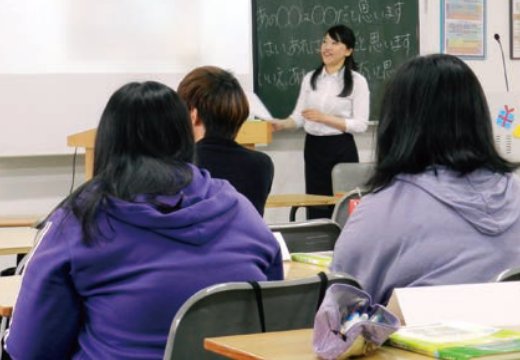 ・Elementary Japanese
・Elementary Japanese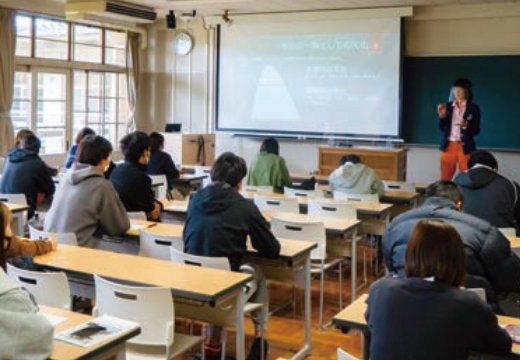 ・Studies in Multiculturalism
・Studies in Multiculturalism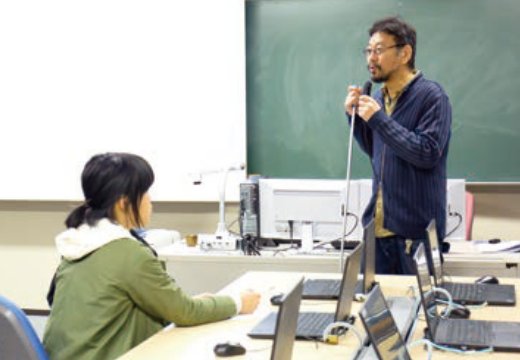 ・Volunteer Network
・Volunteer Network